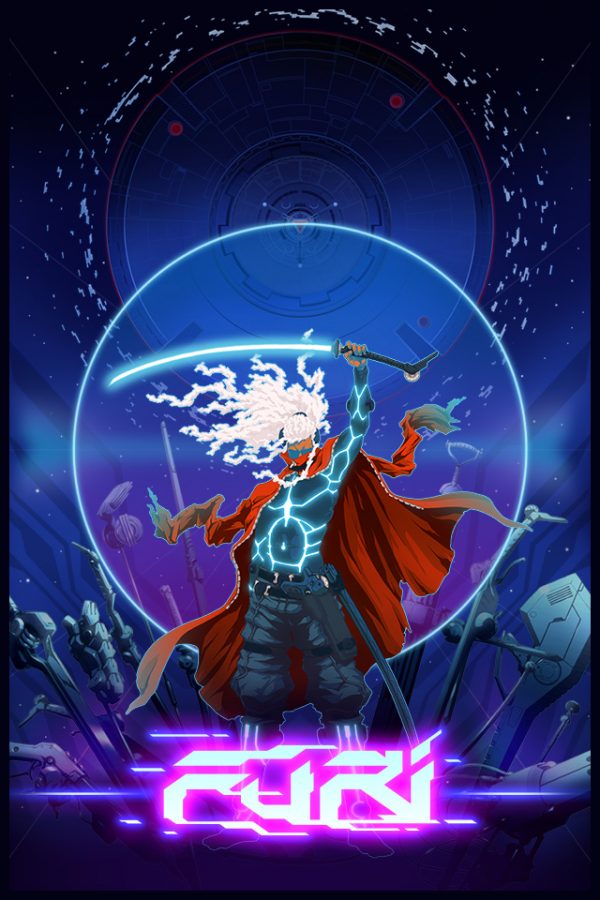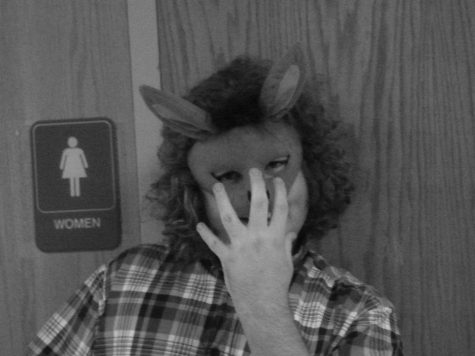Furi Review (Furiview?)
September 23, 2016
Furi is a stylish action game where you fight ten or so very difficult bosses. You’re an unnamed inmate in a prison made of eleven floating areas in space. You get broken out by a mysterious man with a giant rabbit’s head over his face, and you have to kill every jailor (each in charge of one area) to escape with just a sword, gun, and your wits. After you kill one, you have a three-to-five minute sequence where you walk to the next boss’ realm, giving you a chance to decompress. It’s a game that takes a few single ideas and mechanics and laser focuses in on them, giving the game triple-A polish on an indie budget.
Furi’s minimalist mechanics are contrasted by its visuals and music, combining a garish neon, replete with surreal character designs that still quickly convey a bosses’ fighting style and personality, with music designed by several involved in the soundtrack for the blood-and-neon soaked Hotline Miami 2. The characters are designed by Takashi Okazaki, artist and writer for the cult classic Afro Samurai, and the music is excellent at getting your blood pumping and providing a nice melody to hum long after you beat the game.
The gameplay itself is minimalist but deep. You can slash with your sword and shoot with your gun. You can do a charged version of either attack. To dodge attacks, you either dash forward ten or so feet instantly, or you can parry the attack- much less forgiving timing, but if you block an attack you can get a bit of health back. You have three health bars. When you empty one, the boss’ current health bar is refilled. When you empty a boss’ health bar, your current health is raised to the maximum and you get another continue.
The simplicity of the controls doesn’t prevent minor gripes, however- the gun’s regular fire doesn’t have a way to precisely aim it beyond blindly firing and correcting, which would be okay if the projectiles weren’t incredibly slow- it takes precious half-seconds to line up your shots on a stationary target, let alone when they’re flying, dashing, and jumping. Additionally, since the dash is charged by holding down the same button as the regular dash, you only dash when you release the button- which will cost you a life at least once if you’re not expecting it.
Despite the limited toolset compared to other titles in the genre (especially compared to heavyweights like Devil May Cry, Bayonetta, and Ninja Gaiden), the minimalistic controls mixed with the complex attacks of the bosses give a certain clarity to fights- you’re fighting for your freedom, you’re not going to taunt them or flashily dance around them.
One thing that can’t be overstated, however, is its difficulty. If you get this game, expect to die again and again before you figure out the little trick that lets you “beat” the attack or dizzying projectile pattern. While Furi has its missteps (I ran into a bug several times where I never got up after losing a health bar, forcing me to restart the fight entirely), when the game goes well it’s an entrancing game where the music, simple controls, and high level of focus needed blend together into a sort of trance- and the catharsis of finally beating one of the bosses is hard to match.
Get this game if you want a stylish, difficult game with a great synth soundtrack and replayability based on mastering the fights. Don’t get it if you dislike repeated game overs, memorizing patterns, cryptically-told stories, or games that last about six hours.





























